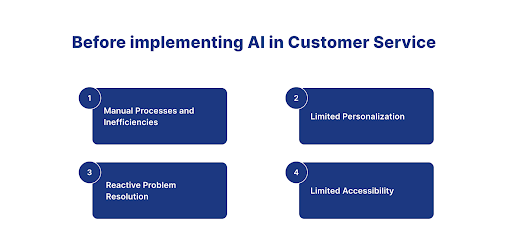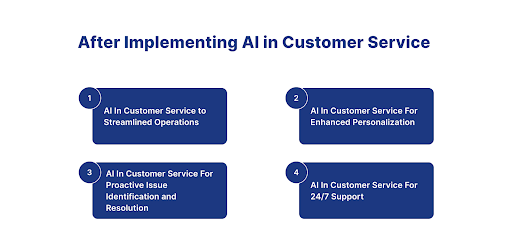AI In Customer Service: A Comprehensive Exploration of AI Implementation In Customer Service Of Payment Industry
As the payment sector undergoes fast digital change, using AI In Customer Service emerges as a critical success factor
Introduction

- As the payment sector undergoes fast digital change, using AI In Customer Service emerges as a critical success factor. In this deep examination, we dig into why AI must be applied in customer services within the payment business. Using the 'before and after' bridge content strategy framework, we explore AI's tremendous changes to manual procedures, customization, issue resolution, and accessibility.
Before implementing AI in Customer Service

1. Manual Processes and Inefficiencies
-
Traditional customer service models in the payment sector relied heavily on manual operations. Customer inquiries, issue resolution, and transaction administration heavily relied on human participation, presenting several issues.
-
Manual Query Handling: Human personnel handled customer inquiries, which often resulted in delays due to the large amount of requests. This manual technique resulted in slower reaction times and a higher risk of human mistakes.
-
Issue Resolution Bottlenecks:: Customer complaints, such as transaction anomalies or account mistakes, necessitated time-consuming investigations. The manual nature of these processes lengthened issue resolution timeframes and raised the strain on customer support workers.
-
Transaction Management Difficulties: Managing transactions manually was prone to mistakes, and scalability became a big issue. As transaction volumes rose, manual procedures failed to keep up, resulting in inefficiencies and a more significant risk of errors.
2. Limited Personalization
-
Personalization was frequently an issue in the old payment sector customer service environment—the lack of advanced data analysis tools and insights made personalizing services to individual tastes difficult.
-
Generic Responses: Client service representatives delivered formulaic replies to questions, needing more depth and specificity to handle particular client demands. Customers were frequently left feeling unappreciated and their complaints unaddressed due to this strategy.
-
Limited Understanding of Preferences: Traditional systems failed to acquire and evaluate significant consumer behavior, transaction history, and preferences datasets. As a result, service providers could not get thorough insights into specific client preferences.
-
Difficulty Anticipating requirements: Without a sophisticated understanding of consumer behavior, anticipating their needs or giving proactive solutions to prospective challenges remained a significant barrier. Services were reactive, responding to client problems after they had been voiced.
3. Reactive Problem Resolution
-
Addressing difficulties and resolving problems mainly was reactive in the payment industry's conventional customer service strategy. Customer care workers waited for consumers to submit issues or complaints, resulting in delayed replies and a higher chance of customer discontent.
-
Customer-Initiated Issue Reporting: Customers were responsible for detecting and reporting issues ranging from transaction irregularities to accounting mistakes. This system depended primarily on users actively contacting customer service, resulting in delayed problem discovery.
-
Customer disturbance Has increased: The reactive nature of problem response has frequently resulted in increasing consumer disturbance. Unresolved issues may persist, affecting the customer experience and creating financial trouble or displeasure.
-
Manual Detection Challenges: The reliance on manual processes for issue detection made it challenging to identify patterns or trends that could indicate potential problems before they became widespread.
4. Limited Accessibility
-
Addressing difficulties and resolving problems mainly was reactive in the payment industry's conventional customer service strategy. Customer care workers waited for consumers to submit issues or complaints, resulting in delayed replies and a higher chance of customer discontent.
-
Customer-Initiated Issue Reporting: Customers were responsible for detecting and reporting issues ranging from transaction irregularities to accounting mistakes. This system depended primarily on users actively contacting customer service, resulting in delayed problem discovery.
-
Customer disturbance Has increased: The reactive nature of problem response has frequently resulted in increasing consumer disturbance. Unresolved issues may persist, affecting the customer experience and creating financial trouble or displeasure.
-
Manual Detection Challenges: The reliance on manual processes for issue detection made it challenging to identify patterns or trends that could indicate potential problems before they became widespread.
After Implementing AI in Customer Service

1. AI In Customer Service to Streamlined Operations
-
AI in customer service provides a fundamental shift in function within the payment business. Using sophisticated technology makes operations more streamlined, efficient, and responsive.
-
Automated Query Resolution: AI-powered chatbots with natural language processing (NLP) skills answer regular consumer questions instantaneously. These chatbots can grasp the context of the inquiries, present relevant
information, and respond quickly. This automation speeds up response times and frees human agents to focus on more challenging jobs.
-
Efficient Issue Resolution: AI systems, particularly those that use machine learning techniques, may evaluate previous data to uncover patterns connected to frequent difficulties. Because AI systems can predict potential problems and suggest solutions based on past experiences.
-
Optimized Transaction Processes: AI contributes to the automation of transaction management. Whether it's processing payments, reconciling accounts, or fraud detection, AI systems can handle these tasks quickly and precisely. The result is reduced errors, improved accuracy, and the ability to scale operations seamlessly to accommodate growing transaction volumes.
-
Enhanced Scalability: Unlike manual processes that struggle with scalability, AI systems are designed to handle vast amounts of data and perform tasks at scale. This scalability ensures customer services can adapt as the payment industry grows without compromising efficiency.
2. AI In Customer Service For Enhanced Personalization
-
The introduction of AI into payment sector customer services revolutionizes the customization provided, ushering in a new age of personalized and proactive interactions.
-
Data-Driven Insights: AI systems powered by advanced data analytics sift through massive datasets containing consumer interactions, transaction histories, and behavioral trends. This wealth of information enables AI systems to obtain significant insights into individual preferences, spending habits, and engagement patterns.
-
Tailored suggestions: AI-powered systems leverage this information to provide clients with highly tailored suggestions. The recommendations are highly customized to customers' requirements and tastes, whether proposing specialized financial products, alerting them about relevant deals, or delivering individualized budgeting guidance.
-
Proactive Issue Resolution: AI can forecast prospective difficulties or concerns that a consumer may have by studying past data. This enables customer support to assist proactively, resolving issues before they worsen. This improves the client experience and promotes a sense of care and attentiveness.
-
Dynamic Customer Profiles: AI continuously updates customer profiles based on real-time data, ensuring that the personalization remains dynamic and reflects the customer's evolving preferences. This flexibility guarantees that services remain relevant and connected with the customer's financial path.
3. AI In Customer Service For Proactive Issue Identification and Resolution
-
Incorporating AI in customer service in the payment sector ushers in a dramatic transition from reactive to proactive issue resolution, benefiting service providers and customers.
-
Predictive Analytics: Using powerful predictive analytics and machine learning algorithms, AI examines large datasets comprising consumer interactions, transaction histories, and account activity. This enables the system to discover trends indicative of possible concerns before they worsen.
-
Early Detection of Anomalies: AI systems are good at identifying anomalies or inconsistencies in transaction patterns. This capacity enables the early detection of fraudulent actions, allowing preventive steps to be implemented before consumers are harmed.
-
Pattern Recognition for Frequent Difficulties: By identifying trends in previous data, AI can discover frequent difficulties clients encounter. This helps customer service teams to address and fix these issues on a larger scale, averting significant interruptions.
-
Automated Alerts: AI systems may be trained to create automatic alerts for customer care teams when specific predetermined thresholds or trends are observed. This guarantees that human interaction occurs immediately, even before clients know of potential difficulties.
4. AI In Customer Service For 24/7 Support
-
Continuous Availability: AI-powered chatbots and virtual assistants run seamlessly around the clock, ensuring clients have access to help at all times. This constant availability eliminates the restrictions of typical operation hours and supports consumers in multiple time zones.
-
Instant Responses to Concerns: AI chatbots deliver rapid responses to client concerns, providing instant assistance without users needing to wait in lines or adhere to set support hours. This improves the entire customer experience by delivering quick and effective help.
-
Real-Time Issue Resolution: AI systems can address common concerns and deliver solutions in real-time, regardless of when the client contacts them. This guarantees that significant problems are handled quickly, enhancing customer satisfaction and loyalty.
-
Scalability for heightened Demand: AI's capacity to manage many concurrent contacts guarantees that assistance remains efficient even during heightened demand. Scalability is critical in providing continuous and responsive services, especially during peak periods.
Conclusion
- AI in customer service in the payment sector represents a quantum leap in service quality and operational efficiency. This in-depth investigation, which uses the 'before and after' bridge content strategy paradigm, emphasizes the revolutionary influence of AI on manual procedures, customization, issue resolution, and accessibility. As payment service providers adopt AI, they position themselves as trailblazers in an era where customer-centricity and technical innovation are critical for long-term success in the digital realm
How Digiqt will help you adapt AI in the sales department
-
At Digiqt, we are dedicated to assisting companies in automating critical processes. Our highly skilled and professional team ensures the timely development and delivery of AI software. We commence by thoroughly understanding our client's specific requirements, and based on these requirements, our proficient team develops the AI software. Furthermore, we provide our clients with monthly updates on the software development progress.
-
Digiqt's commitment to automation, client-centric software development, and regular updates ensures efficiency and effectiveness in streamlining insurance operations.
Contact Us
Frequently Asked Questions
What are AI In Customer Service?
AI In Customer Service are AI-powered systems that automate and optimize processes using machine learning, natural language processing, and intelligent decision-making capabilities.
How do AI In Customer Service work?
AI In Customer Service work by analyzing data, learning patterns, and executing tasks autonomously while integrating with existing systems to streamline operations and improve efficiency.
What are the benefits of using AI In Customer Service?
The benefits include increased efficiency, reduced operational costs, improved accuracy, 24/7 availability, better customer experience, and data-driven insights for decision-making.


















